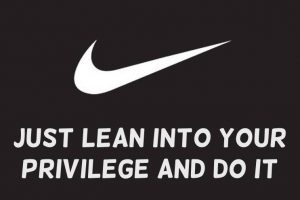Privilege Exposed – Jammed Ad

Similarly to the original ad, I jammed this ad in a way that maintained its vagueness so that it could be interpreted broadly. As I mentioned, the original ad’s disingenuous message is that you as the consumer are the only one standing in the way of your own goals and to get past that you need to get over it (and possibly buy their athletic wear along the way to make it easier to do so). For those who live in a world blind to all of their privileges, a quote like “just do it” allows them to believe that it is only their lack of will that was not allowing them to make gains within their already privileged life. However, I would argue that for those who are already “doing it” as hard as they can, a quote like this may come off as either discouraging or even downright offensive. This is echoed, within the Canadian context, by Brodie who argues that factors outside of the control of an individual’s capacity to make ends meet there are social reforms, pushed forward by neoliberalism, that have taken hold and are especially affecting women who are often additionally burdened with the task of care. (1)
My jammed version of the ad brings to the forefront what Nike is really telling their consumer base, whether intentionally or not. It urges the consumer to question the assumption that Nike has our best interests in mind and that their message will somehow be key to us unlocking our full potential. Instead, I suggest that the key to the majority of us achieving our goals is through the dismantling of our unjust world which includes ensuring that those who are not currently “doing it” have the potential to “just do it”. For that to be the case, I suggest that those who stand as gatekeepers to opportunities, or who hold others down with racist understandings of the world, confront the fact that motivational ads only work to feed the already privileged into taking even more of what they don’t deserve.
1. Brodie, J. (2010). Globalization, Canadian family policy, and the omission of neoliberalism. North Carolina Law Review, 88, 1559 – 1592.